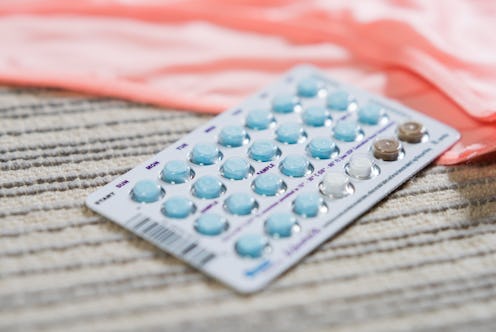Life
7 Surprising Side Effects Of Hormonal Birth Control Nobody Told You About

A few months after I started using the ring, a form of hormonal birth control that goes inside your vagina and gets replaced each month, a friend told me that I looked "bustier." I was a bit alarmed by her directness, but I think she was right: I wear slightly smaller bras now that I'm off it. When I first went on the ring, all my doctor told me about it was that it could increase my risk for blood clots. What else, I wondered, are doctors not telling us about the potential side effects of hormonal birth control?
"Hormonal methods of birth control cause certain side effects due to their influence on your body’s chemistry," Ann Mullen, Director of Health Education at Cycle Technologies, tells Bustle. "These methods include the pill, the ring, the hormonal IUD, the implant (in your arm), and the birth control shot. The body’s natural response to the synthetic hormones can be similar to when you are pregnant, so you might feel nausea, bloating, or swollen or tender breasts. Other side effects include headache or migraine, break-through bleeding, loss of periods, and mood swings."
To be clear, this doesn't mean you are likely to experience these side effects after going on birth control. But if you do notice any of them after you start, there could be a connection there, and it's worth talking to your doctor if you don't like the effects you're experiencing or notice anything out of the ordinary. Here are a few possible side effects of hormonal birth control that you may not have been told about.
1Pain During Sex
Dr. Rachel Gelman, DPT, PT, a physical therapist at the Pelvic Health and Rehabilitation Center, tells Bustle she's had clients who experienced pain during sex after going on hormonal birth control. "Oral contraceptives (OCPs) cause an increase in a protein called Sex Hormone Binding Globulin (SHBG)," she says. "This protein picks up testosterone and makes it inactive. The vaginal opening depends on testosterone to keep it happy and healthy. So the pill leads to decreased testosterone levels which means the tissue at the vaginal opening is no longer getting what it needs and this can lead to pain and dyspareunia (pain with sex). OCPs impact estrogen levels as well and the vulvar tissue is dependent on that hormone as well."
2Depression
The research over whether hormonal birth control leads to depression is mixed, so it may not be something you were warned about. However, Kara Manglani, CNM, midwife and founder of The Fertile Times, says some people report sadness or depression after going on hormonal birth control. Some experience these feelings right before their periods in particular.
3Vaginal Dryness
Sometimes, birth control can decrease the amount of vaginal lubrication you produce when you get aroused, says Manglani. "You may find it more comfortable to utilize a lubricant during intercourse." Some also find that hormonal birth control decreases their sex drive, she says, which could in turn decrease vaginal lubrication.
4Dry Eye
It seems random, but the hormonal changes birth control causes can lead to changes in tear production, Morgan Statt, Health & Safety Investigator at ConsumerSafety.org, tells Bustle. As a result, you might develop a condition called dry eye, which can lead to eye pain and light sensitivity. There's also some research suggesting that birth control could increase your risk for glaucoma, an eye condition that can lead to impaired vision or blindness, though your risk still likely won't be significant.
5Hair Loss
"If you're especially sensitive to the hormones in oral contraceptives or have a family history of hair loss, you may experience this side effect while on the pill," Statt says. "Our hair goes through cycles of growth and stagnant transitional periods where no hair is growing at all. Hormonal birth control can trigger this non-growth part of the cycle and contribute to hair loss in the process." So, if you notice yourself losing more hair in the shower than usual (or losing hair outside the shower), your birth control might be to blame.
6Blood Clots
My doctor was right about this part, but it still isn't something everyone's aware of. Hormonal birth control can especially increase your risk for blood clots in your legs, also known as deep-vein thrombosis, says Statt. This is because estrogen and progesterone can raise the amount of clotting factors in your blood. This may increase your risk of blood clots by three to four times, but your risk is typically already really low, so it's still not significant.
7Breast Growth
It may not have been my imagination: Birth control can sometimes leads to breast growth, according to Healthline. These changes may typically come from either weight gain or fluid retention as a result of hormonal changes. But as Dr. Anne Burke, an associate professor of gynecology at Johns Hopkins Hospital in Baltimore, Maryland, told Her Campus, most women will not notice any significant changes to their breast size. And as I experienced, they're not permanent if you go off birth control.
"There is no way to predict who will experience these side effects," says Manglani. "If you are taking a hormonal birth control and you experience unwanted side effects, your provider will switch brands and may consider a lower dose alternative." Don't feel like you have to live with any symptoms you don't want — there are plenty of options out there.
This article was originally published on